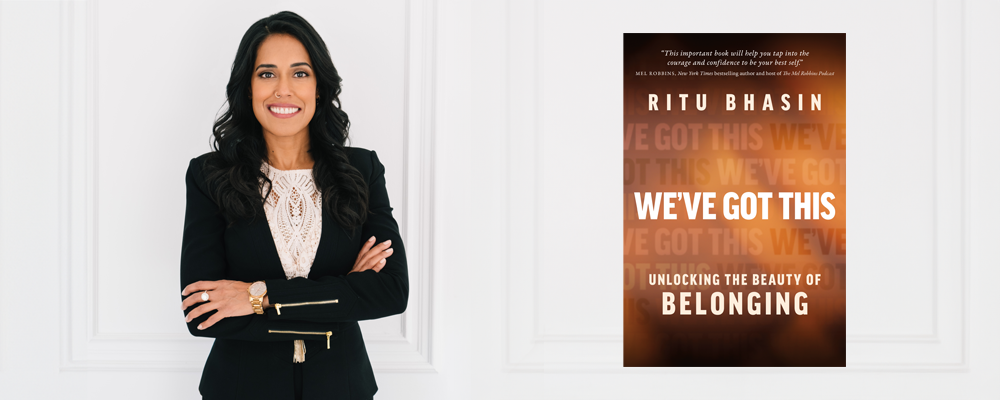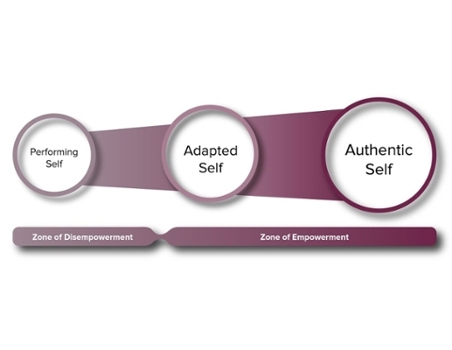10 Questions with Ritu Bhasin (LL.B. ’00)
January 12, 2024

Ritu Bhasin (LL.B. ’00) is an award-winning speaker, author, and expert in belonging, equity, leadership, and empowerment, and the CEO of bhasin consulting inc., a renowned diversity, equity and inclusion (DEI) consulting firm. Once a Bay Street lawyer, she left the legal profession to embark on a journey to help organizations become more inclusive, embrace her authentic self and empower others to step into their own authenticity.
In June 2023, she released her second book We’ve Got This: Unlocking the Beauty of Belonging, which has already risen to the top of international best seller lists. Through this book, she helps readers learn to claim belonging and create it for others. We recently sat down with Bhasin who shared her expertise on all things belonging, equity, diversity, inclusion and how we can work to cultivate these values in our lives and work.
1. Who was the reader you had in mind for We’ve Got This and what do you hope they learn from the book?
I wrote the book for anyone who has struggled to belong, or who has struggled to feel accepted for who they are. And based on my work, I can tell you that this could be just about anyone because, as humans, we’re all wired to long for belonging. In reading my book, I want people to feel inspired and know that they can create a life they love that’s rooted in authenticity and belonging.
2. What inspired you to write the book and why is it timely right now?
I was called to write We’ve Got This based on my own experiences with struggling to belong for decades, but then finally crossing over to learning how to claim belonging for myself. And in doing DEI and leadership work with organizations around the world, I’ve come to see that so many people out there are also struggling with the same journey. This is what compelled me to write a book about how to claim and create belonging. I think my message is particularly timely given that we know that, as a society, we’re grappling with increased loneliness, isolation, social injustice, mental health issues and so much more. I hope my book provides readers with the tools and practices to address these challenges and live a life rooted in belonging.
3. Your first book The Authenticity Principle focuses on how we can show up authentically in our lives and work. How is authenticity related to belonging?
Authenticity and belonging go hand in hand. Belonging is the profound feeling of being honored and accepted for who you are. Belonging is about being authentic – it’s about showing up as your authentic self as much as possible. When you do this – when you consistently show up as who you really are – this is what unlocks belonging for you. In a nutshell, belonging is the outcome of being authentic.
4. There has recently been much public dialogue around the loneliness epidemic and negative impacts on health. How can claiming belonging help?
Belonging is about being accepted by your own self but also by the people you choose to be bonded with. It’s about being deeply connected to a few people or feeling deep fellowship as part of communities. When you feel like you belong to yourself, or you sense belonging in the presence of others, you’re less likely to experience loneliness. When we feel lonely, what’s really happening is we feel like we don’t belong. But when we do our work to claim belonging for ourselves with ourselves, we’re able to heal our woundedness, interrupt loneliness and feel more whole.
5. What are the benefits of building a workplace culture of belonging?
Cultures rooted in belonging enable people to speak more freely, share their opinions, ask questions, engage more openly and, ultimately, be more of their authentic selves. And all of this is what drives innovation and creativity and enhances decision making. We end up building more meaningful relationships with our team members, we better serve our customers/clients and stakeholders, and we produce stronger results because of greater engagement. At the end of the day, belonging is critical for organizational success.
6. What would you say to people who struggle with the balance between authenticity, vulnerability and professional boundaries?
 I have a model called the Three Selves Framework that is very helpful in addressing this very challenge (which I talk more about in-depth in my blog). In the workplace, you may find that you don’t feel safe to reveal your Authentic Self, which is the most important of the Three Selves, but you still feel safe to show up as your Adapted Self. Your Adapted Self is the self that willingly and happily chooses to adjust your behaviors to meet your needs and the needs of others. (The Performing Self is the final self – who you show up as when you feel you don’t have a choice but to conform, change, or hide aspects of your identities – especially because of the judgments coming your way. It’s like you’re an actor on a stage – you’re performing you rather than being you.) For many of us, it feels safer to be more adaptive in how we’re showing up, which is perfectly fine because our Adapted Self is still a manifestation of our authenticity. In leveraging the Three Selves, you’ll come to see that the Adapted Self is a safe place to stay in moments when you feel like it doesn’t feel right or safe to be your Authentic Self.
I have a model called the Three Selves Framework that is very helpful in addressing this very challenge (which I talk more about in-depth in my blog). In the workplace, you may find that you don’t feel safe to reveal your Authentic Self, which is the most important of the Three Selves, but you still feel safe to show up as your Adapted Self. Your Adapted Self is the self that willingly and happily chooses to adjust your behaviors to meet your needs and the needs of others. (The Performing Self is the final self – who you show up as when you feel you don’t have a choice but to conform, change, or hide aspects of your identities – especially because of the judgments coming your way. It’s like you’re an actor on a stage – you’re performing you rather than being you.) For many of us, it feels safer to be more adaptive in how we’re showing up, which is perfectly fine because our Adapted Self is still a manifestation of our authenticity. In leveraging the Three Selves, you’ll come to see that the Adapted Self is a safe place to stay in moments when you feel like it doesn’t feel right or safe to be your Authentic Self.
We know from research that many people would rather virtually – especially equity-seeking professionals. And this makes sense. For example, for caregivers, it’s easier to help your beloveds when you’re working from home. For people who have health issues, it’s easier to manage your health challenges from home. For people from across equity-seeking communities, in many respects it’s easier to shield from biases when you’re working virtually.
But we also know from research that there are several benefits to working more in person, including that it helps to foster social connections and gives rise to the recency primacy effect.
Given this, as a leader, it’s important you ensure you’re focusing on heightened communication, interactions and feedback delivery for people who spend more time working virtually. You want to be proactive in signaling that they still belong and are part of the team.
8. As a former lawyer and someone who consults for law firms on diversity, equity and inclusion, what changes have you seen and what still needs to evolve?
Over the last several years, we’ve seen a massive shift in the talent pipeline in the legal profession in terms of diversity. There are more People of Colour, women, people from the 2SLGBTQIA+ communities and people from across other cultural identity groups in the legal profession now more than ever. The challenge is that, despite the growing diversity, we’re lagging behind in how we’re cultivating inclusion and equity in our profession. The numbers are growing, but the feelings of belonging are not – many people feel like they can’t bring their authentic selves to work because of the inequities they continue to experience. Legal employers must do more to address individual and systemic inequities, biases and barriers that prevent equitable access to career development and satisfaction for all.
9. What advice do you have for current and future lawyers about how to help foster professional environments where people feel they belong?
The tone at the top cascades down. Team members constantly watch what leaders are doing – how they’re behaving, reacting and responding. Given this, leaders will want to focus on interrupting their own biases because bias is what strikes at people’s ability to belong. Second, leaders want to show up authentically themselves when at work. The more vulnerable leaders are in revealing their authentic selves, the more their team members will feel safe to be who they are, thereby experiencing greater belonging.
10. Young lawyers often struggle with impostor syndrome when entering the workforce. What advice would you give to combat this self-doubt?
In my view, impostor syndrome is directly connected to experiencing a lack of belonging. When we feel like there’s something wrong with us – that we’re unworthy and we’re not good enough – it can cause us to question our abilities. We’ll feel like impostors. But there’s a way out of this! In We’ve Got This, I talk about a concept called our Core Wisdom. When we have heightened Core Wisdom, it enables us to heal our woundedness and let go of feelings of unworthiness and selfdoubt. We start to feel more regulated, grounded and rooted in who we are, which helps us to sense greater confidence and self-assurance. Essentially, Core Wisdom will help you to address the impostor syndrome – and help you to create a life you love that’s rooted in belonging.
+ Where can people find you if they would like to know more about your work?
I have a range of (free!) empowerment resources at ritubhasin.com – sign up for my mailing list to get them right to your inbox. I have extensive (again free!) resources related to leadership and DEI at my consulting firm’s site, bhasinconsulting.com (sign up for our mailing list there too). Finally, you can connect with me on LinkedIn and Instagram. I love receiving messages, so please reach out!
This article appeared in the 2023 edition of the Western Law Alumni Magazine. Read the full issue here.






